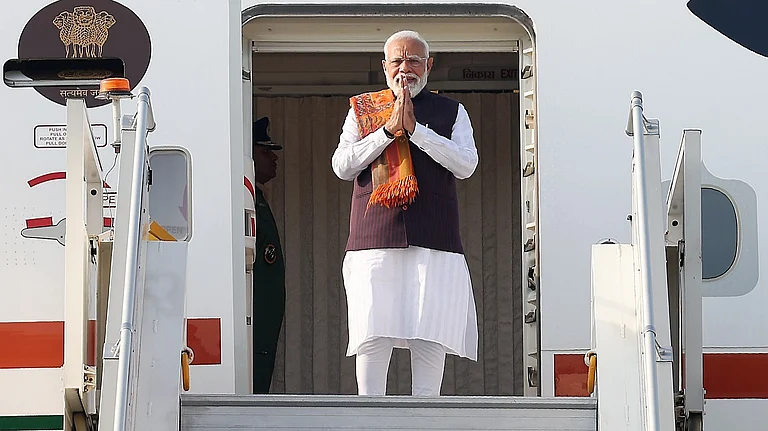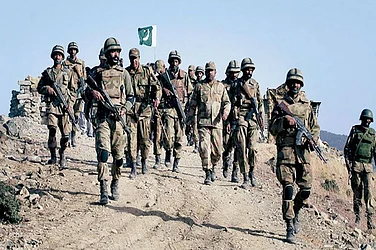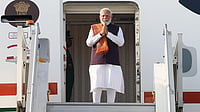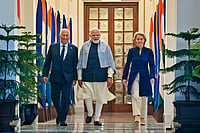Prime Minister Narendra Modi’s meeting with President Joe Biden at his home in Greenville, Delaware, was in the nature of a farewell exchange as they both celebrated the growing strength of India-US ties. The US approved a pending deal for the sale of 31 sophisticated drones that operate below the radar and at high altitudes. A decade ago, the US would not have sold this kind of defence equipment to India, but now, with expanding strategic cooperation, buying defence equipment from the US is routine.
"The United States' partnership with India is stronger, closer, and more dynamic than at any time in history. Prime Minister Modi, each time we sit down, I'm struck by our ability to find new areas of cooperation. Today was no different," Biden said in a post on X.
Briefing reporters after the meeting, Foreign Secretary Vikram Misri said, “Prime Minister Modi thanked President Biden for his pioneering role in strengthening the India-U.S. partnership over the last four years. In particular, he highlighted President Biden's legacy initiative on Critical and Emerging Technologies. There is a Joint Fact Sheet that has been released regarding the India-U.S. partnership. I am sure all of you have it, so I won't go into the details of the fact sheet. I’ll just flag a few… for instance, the U.S.-India roadmap to build safe and secure global clean energy supply chains. Under this, the United States has agreed to leverage nearly $1 billion in multilateral IBRD funding guarantees to accelerate the expansion of safe and secure clean energy supply chains through U.S. and Indian manufacturing of clean energy technologies and components.”
At the end of the talks, both sides released a fact sheet to show the various fields in which India and the US are now engaged. The cooperation is multi-faceted and growing. “Modi emphasized that India and the US today enjoy a comprehensive global strategic partnership that covers all areas of human endeavor, driven by shared democratic values, convergence of interests, and vibrant people-to-people ties,” PTI said in a report from the US. “Prime Minister Modi conveyed his appreciation for the unparalleled contributions made by President Biden in giving impetus to the India-US partnership.”
Significantly, ahead of the Prime Minister’s visit, the pro-Khalistan Sikh leader Gurpatwant Singh Pannun filed a lawsuit in New York’s federal court against the Indian government, NSA Ajit Doval, and others for an assassination plot against him in the US. India had long ago designated Pannun as a terrorist. New Delhi has rejected Pannun's claims. The serious allegations have not derailed relations, due to Washington’s strategic interest in advancing ties with India as a bulwark against China.
However, at the start of the Ukraine war, there was a major issue because of India’s refusal to publicly condemn Russia’s military actions. There was immense pressure on New Delhi not only from the US but also from its NATO allies. However, it was difficult for India, as Russia has been an old and trusted ally. The US and the West are keen for India to side decidedly against Moscow. Though the Modi government is inching closer to the US, it is not yet ready to abandon Russia.
While India continued to vote against anti-Russia resolutions at the UNSC, it also sent humanitarian aid to Ukraine, and Modi told President Putin that this was not an era of war and that problems need to be resolved through dialogue and diplomacy. Earlier this year, the Prime Minister paid visits to both Moscow and Kyiv, leading to speculation that New Delhi could play the role of peacemaker between the two.
The Prime Minister likely spoke at length about his conversations with Vladimir Putin during his visit to Moscow. He had already briefed Biden by telephone soon afterward. Modi also spoke to Putin after his meeting with Ukraine’s leader. As India has good relations with both Russia and the US, it is in a unique position to act as an interlocutor. It is well known that without Washington’s green signal, Zelenskyy cannot agree to a deal.
“President Biden commended Prime Minister Modi for his historic visits to Poland and Ukraine, the first by an Indian Prime Minister in decades, for his message of peace and ongoing humanitarian support for Ukraine, including its energy sector, and for the importance of international law, including the UN Charter,” the fact sheet released by the two sides noted.
Indian officials are non-committal, as expected in such a delicate issue. “We are involved in a set of ongoing conversations. Insofar as the specific question of a peace proposal related to the Russia-Ukraine conflict is concerned, I think I had answered a similar question in the pre-visit briefing in New Delhi as well. I want to again underline that we are involved in a set of ongoing conversations with interlocutors on all sides. Obviously, people see value in India's engagement in these conversations, and we are able to talk to multiple interlocutors. This is not something that is going to have an outcome at the present stage because there is still quite a bit of work that remains to be done. As and when there is something in the nature of what you have suggested, we will come back to you, but at the moment, these are very important conversations that are ongoing with multiple people on all sides of this conflict.”
Modi has landed in Washington at a time when the country is in election mode. President Donald Trump, with whom the Prime Minister shares a good rapport, has already announced that he would be meeting the Indian leader. New Delhi has kept mum on the subject. Unless a meeting is also fixed with Democratic candidate Kamala Harris, it would land India in an embarrassing situation. Foreign Secretary Vikram Misri has not let on anything either in his briefing to reporters in New Delhi before leaving or in Washington, where he was asked the same question.


























